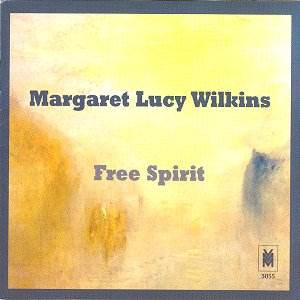Margaret
Lucy Wilkins proves, through this disc, to be a provocative composer.
She is no camp-follower of new or even old romanticism. Certainly
she is not in the neo-classical camp. Her co-ordinates are marked
out in the regions of Tippett and Penderecki. Her orchestrational
palette is suggestive of mature Szymanowski extruded through Tippett
and Nicholas Maw. She is no enemy to the lyric voice but her expressive
style is not bland or obvious.
Struwwelpeter
is a song cycle of macabre poems but the wretched pleasure
of this piece is not just in the macabre but in the protest references
which speak to us in warning about Apartheid, the Holocaust, drug
culture and nuclear war. These are hammered home by the playing
of the old South African national anthem on an out of tune piano
and the use of Offenbach's Barcarolle as a reminder of
the long lines in procession towards the concentration camp 'shower
blocks'. Caustic treatment of the words and the free lines of
the ensemble are similar to parts of Walton's Facade though
with a supercargo from Penderecki (Threnody - listen to
the plummeting vol-planing violins at 07.01) and Maw (Life
Studies). While Musica Angelorum bears its lyric antecedents
the Trio is from a time when Wilkins was uncompromisingly avant
garde.
Barrie
Webb has the field to himself for 366 seconds in which
the music is built from blocks of three and six seconds. The trombone
is a natural singer. Had Wilkins written such a piece in the 1970s
it would perhaps have played with the mewling, barking and howling
avant-garde tricks of Vinko Globokar. As it is the work revels
in the lyric, the sly, the rhythmically tangy and the squat and
pawky natural accents of the instrument. It is stunningly recorded
here.
Webb
surrenders the trombone and picks up the baton for the 1989 symphony.
This is in three named movements which are here laid down in a
single track. Sibelian grace and nobility and Messiaen gamelan-jangle
(4.38 I) mix happily and in splendid profusion.
A
well documented calling card of a disc in which the composer must
surely take some pride.
Rob
Barnett
see
also review by Hubert
Culot and Gwyn
Parry-Jones
